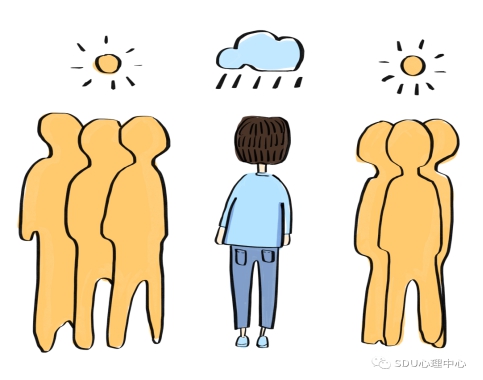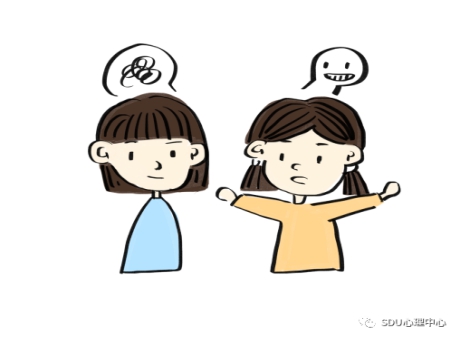Last time, we mentioned empathy, perspective taking and self-reflection are significant capacities in social activities and introduced how empathy helps us enhance emotional bonds with others(Developing Empathy: A Way to Enhance Emotional Bonds With Others). Today we will talk about perspective-taking.
Perspective-taking means to infer the mental process of others, that is, he or she can think from others’ point of view. Accurate perspective-taking allows us to understand others’ priorities and motivations, to anticipate their behaviors, and even to predict their reactions successfully. It helps us to convey our intentions, to negotiate and cooperate with others, to effectively communicate, and to show our compassion and kindness.

If lacking perspective-taking, we are more likely to act inappropriately, such as being too eager, too pressing, too detached, even trapped into social gaffes. As a result, we will gradually lose interest in any kind of communication with others because of defence mechanism (protecting us from the feelings of embarrassment, humiliation, guilty and so on which derived from awkward interactions) and then withdraw from social life.

Unlike the trick of mind-reading promoted by popular culture, perspective-taking is a mental skill to facilitate our daily conversations with others. To get the skill, we should keep the following tips in mind:
01
To realize the tendency of unconscious favoring our own point of view. Our own perspective is so apparent to us that we often overlook other people’s point of view. For example, sometimes our good intentions are misinterpreted by others through face to face contact, not to speak of through typewriting chat online or email. But oftentimes we tend to assume such misinterpretations are caused by other people instead of us.
02
To realize the tendency of taking ourselves as standing point to evaluate other people’s view. We often prefer to accept the view of people who are similar to us other than those who are different.
03
To remember that other people’s mindscape is usually far more different from ours. From this perspective, we should make efforts to know how other people may see things, how they may react, or how their agenda may be different from our own. But unfortunately, most of us are unlikely to take these into account in a conversation. For example, when we tell a joke, we usually give almost exclusive priority to whether we find the joke is funny or not, rather than considering it in others’ shoes.

Above all, we should always remind ourselves how other people’s point of view may differ from our own, what their mindscape may be, and what their frame of thinking may be. We should also pay more attention to the others’ priorities, preferences, and even stereotypes, to the history between us, and to the context of current situation. Taking a few minutes to think these questions will facilitate your communications with others. By the way, to reduce misunderstanding in communication,we’d better start a conversation face to face instead of online typewriting .
观点采择:我懂你的意思
上篇推文里,我们提到共情、观点采择和自我反思是社交所需的重要能力,并介绍了共情能力是如何帮助我们提高与他人的情感连接的(培养共情能力,强化你的人际间情感连接)。今天我们来谈一下观点采择。
观点采择是指推断别人心理活动的能力,也就是说能够站在他人角度思考问题。敏锐的观点采择能力能够帮助我们理解他人的动机意图,推测他们的行为,甚至准确预测他人的反应。这能够帮助我们更好地传递所要表达的信息,与他人协商合作,进行有效的互动交流,以及展现和表达我们的善意。
这项能力的缺乏会让我们的社交捉襟见肘,在社交中的表现不当:太渴望,太迫切,或者太疏离,甚至陷入社交困境。久而久之,我们会在防御(不让我们产生因尴尬的互动而产生的窘迫、羞辱、内疚等感觉)之下,逐渐对社交失去兴趣,进而回避社交生活。
不同于大众文化宣扬的读心术技巧,观点采择是个脑力技能,能够促进我们的日常社交。要获得这项技能,我们需要记住以下几点:
01
意识到我们自己身上的自我赞同的无意识倾向。我们自己的观点太过明显以致于我们经常会忽视他人的想法。比如,在日常面对面交往中,我们有时候会遇到他人误解我们好意的情况,更别说在网上聊天或用电子邮件等进行文字交流的时候,这种情况更是经常发生。
02
意识到我们倾向于以自己为参照点来看他人的想法。我们倾向于接受跟自己相仿的人的观点,而不是不同的人的观点。
03
记住别人的想法很多时候跟我们自己的差别很大。从这个角度来看,在交往中我们应该努力从他人的视角看待事务,努力理解他们的所想、所思、所感,甚至看到别人的时间安排都是与自己很不同的。但不幸的是,在我们的交往中往往很少关注这些。比如,当我们讲笑话的时候,通常优先考虑的不是别人的感觉,而是自己是否觉得好笑。
总之,在人际交往中,我们要时刻提醒自己注意别人跟自己想法是很不一样的,他们自有自己丰富的内在世界,也有自己的思考模式。我们应该更多注意到他人在处理事情时的优先级、偏好,甚至固有模式,注意我们和对方的关系基础和当下的交流环境。对这些方面的思考将会有助于我们接下来的交往。另外,为了减少人际交往中的误解,能面对面交往的,就尽量减少文字聊天,那样可能会带来更多误解。